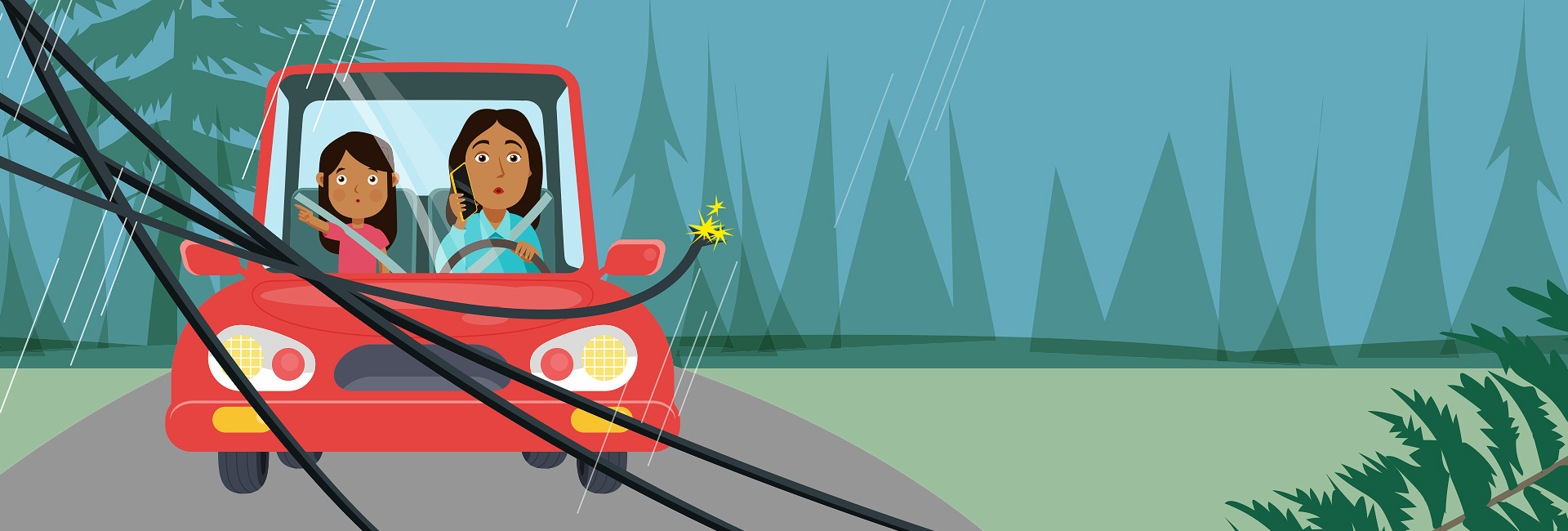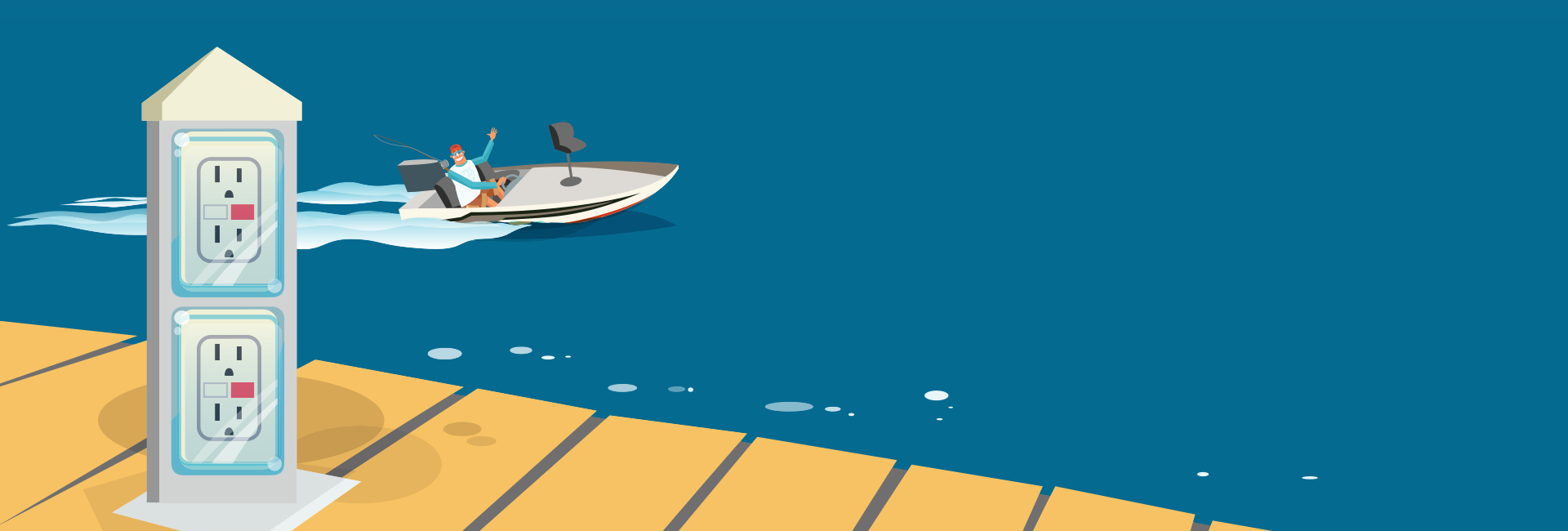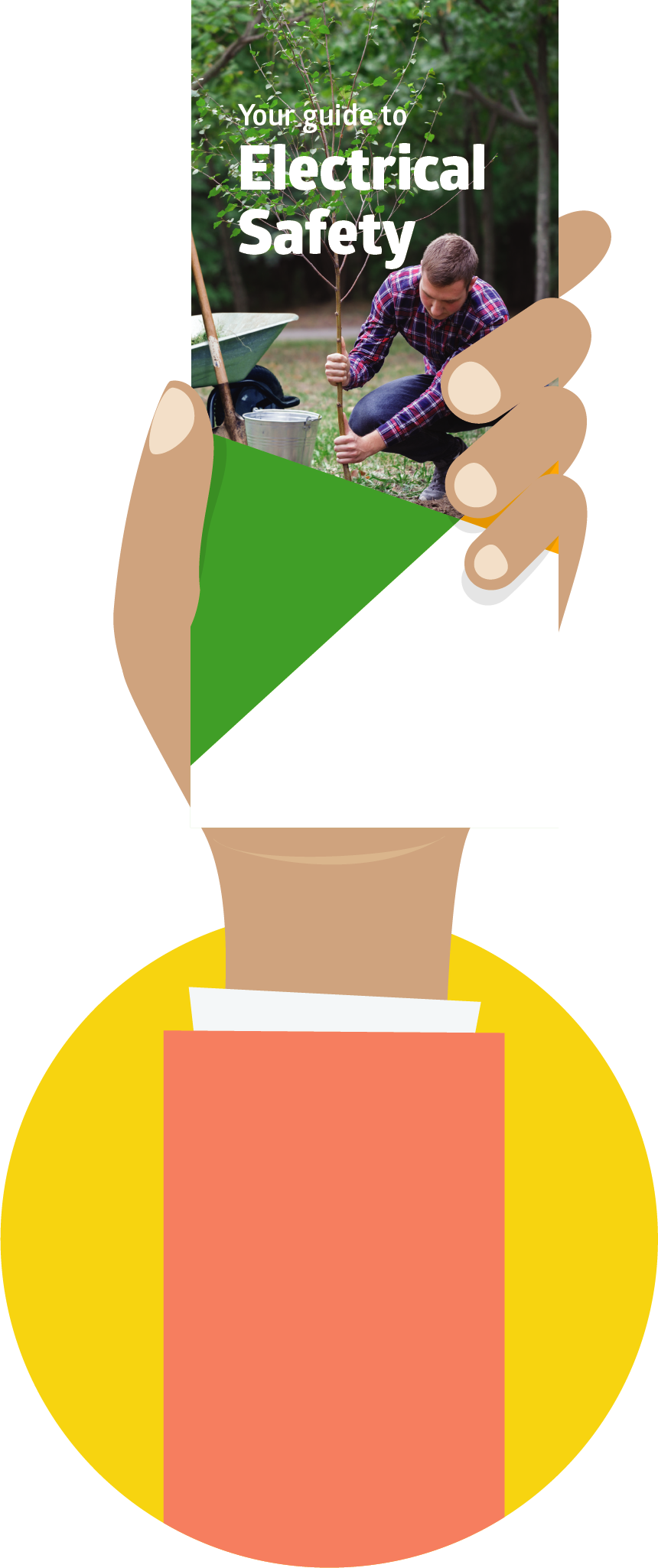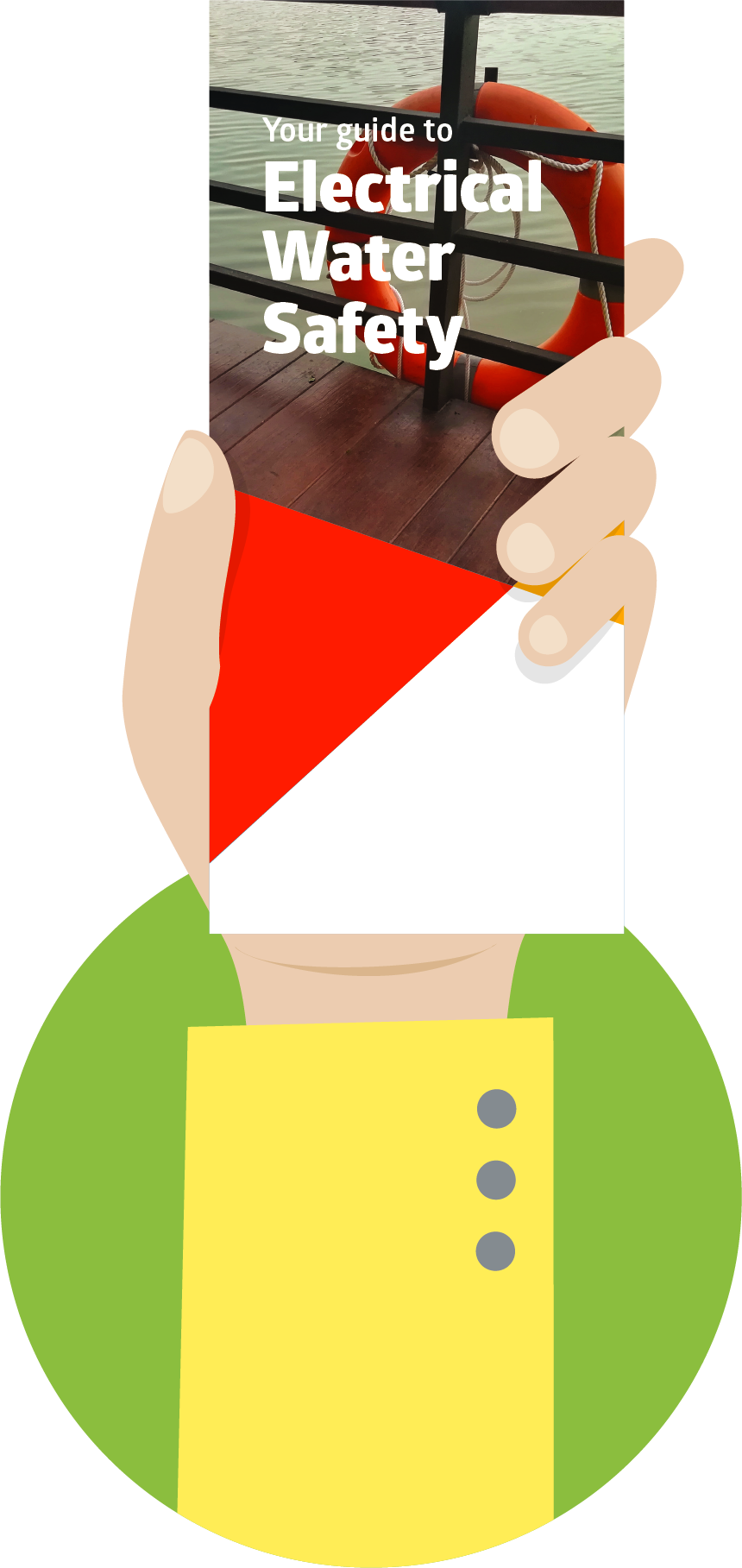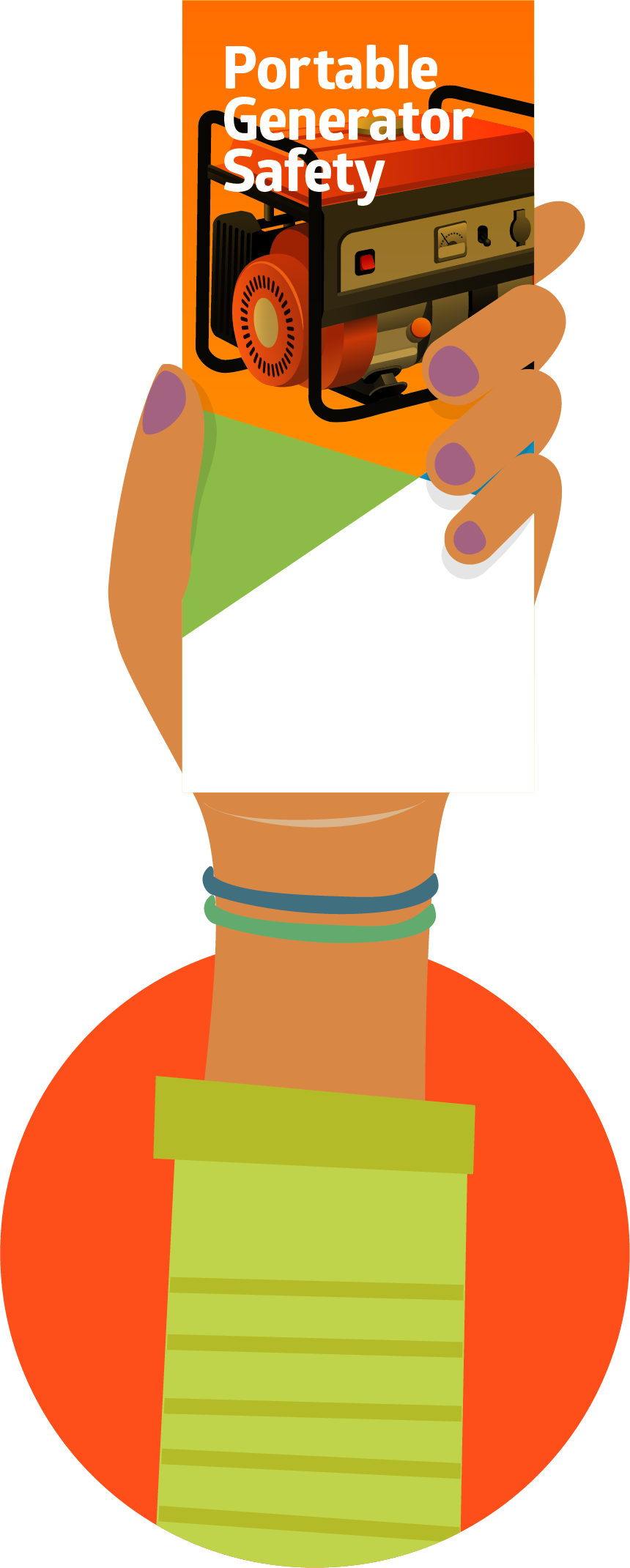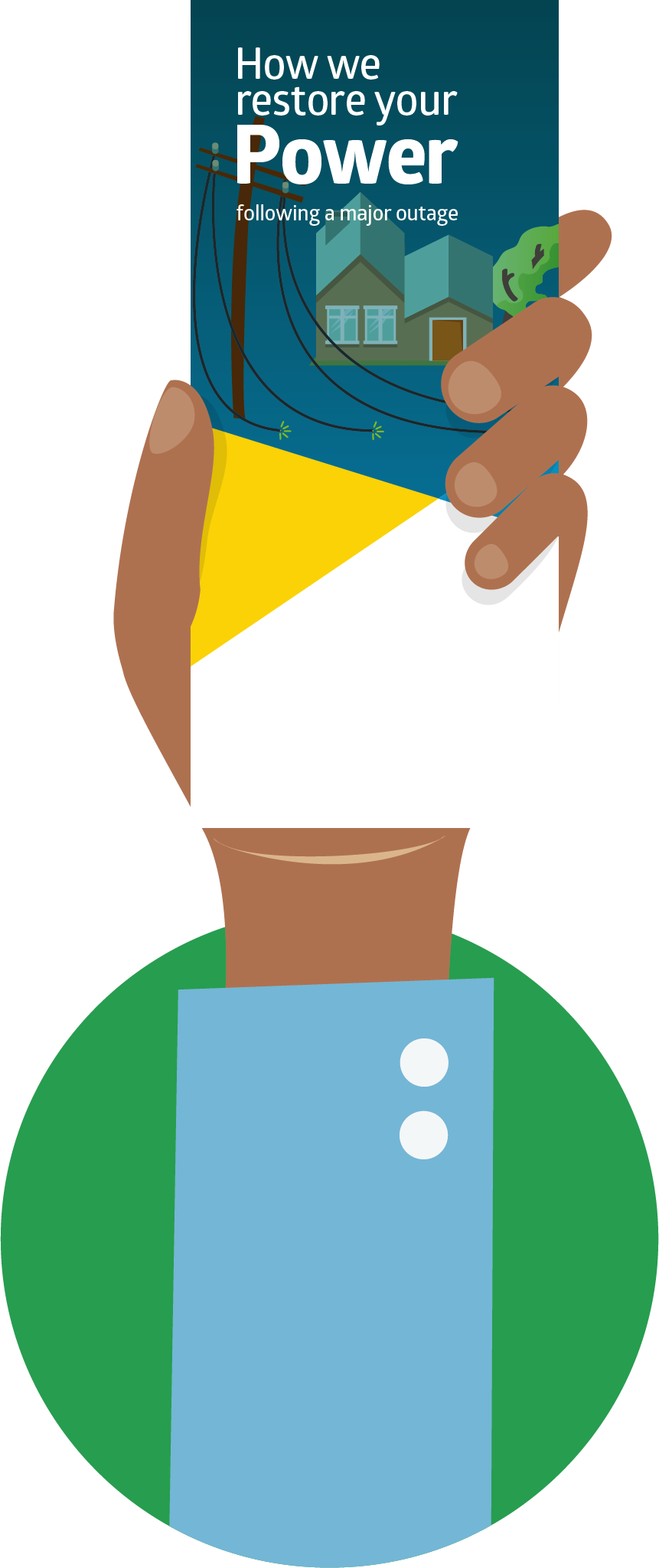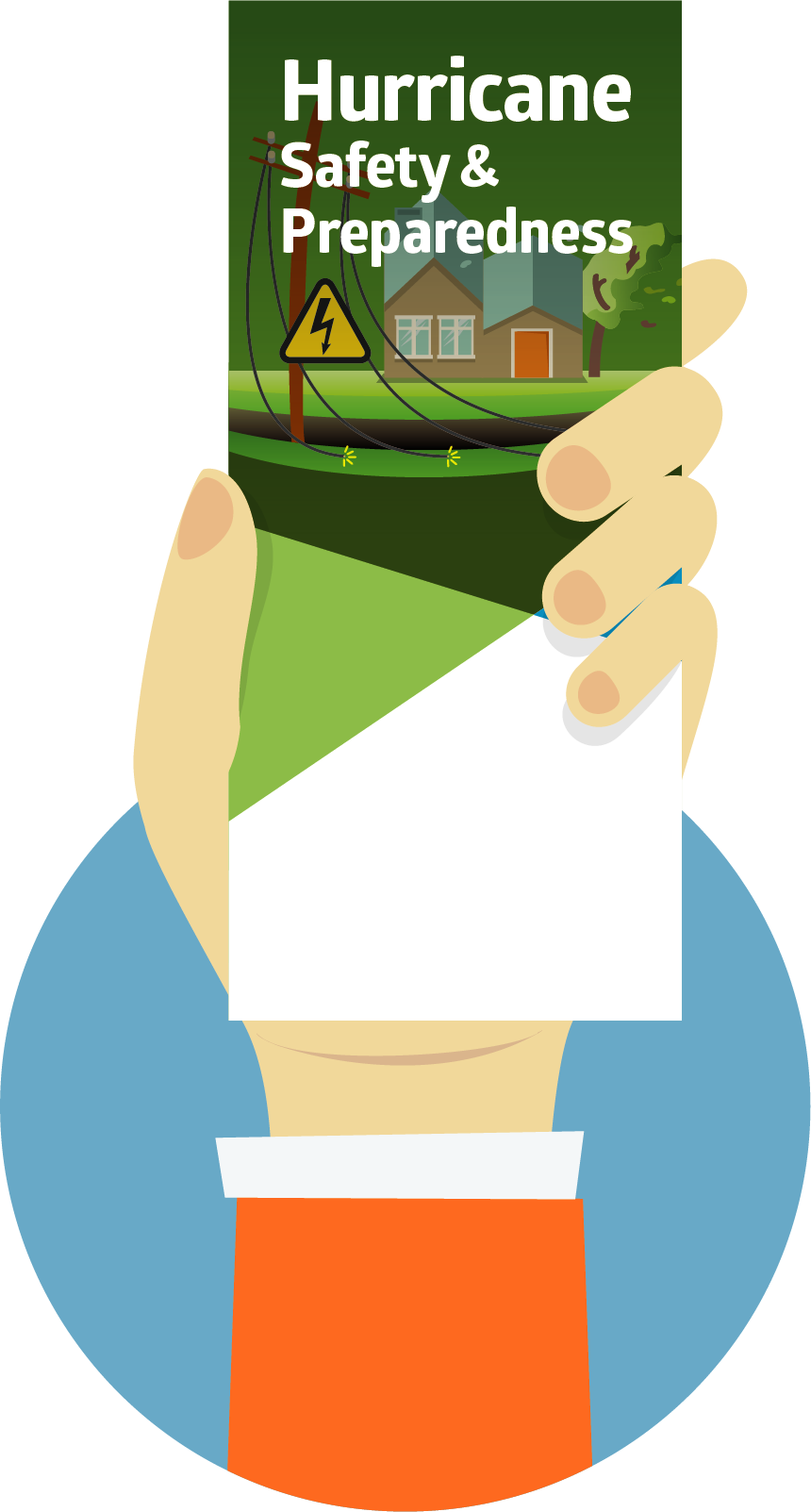
Being safe around electricity begins with being aware of the hidden dangers.
Be aware everywhere and you’ll stay safe—at home, at work and on the go.
Stay safe above and below.
Some powerlines are easy to see. Others are completely hidden from view. Visible or not, power lines can be deadly, so take a few minutes to learn the dos and don’ts of power line safety.
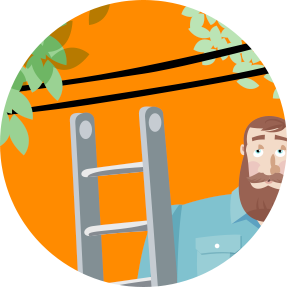
- Do not touch anything that is in contact with the power line.
- Keep equipment at least 10 feet away from power lines.
- Carry ladders and other equipment horizontally.

- Contact your electric cooperative immediately to report downed power lines outside your home.
- Treat all downed power lines as energized. Stay at least 10 feet away from fallen power lines.
- Never touch a person who is in contact with a downed power line. Call 911 immediately.

- Protect yourself and others from unintentionally hitting underground utility lines, like water, electricity and natural gas.
- Whether you are planting a tree, installing a mailbox or fence, or building a deck, call 811 first.
- Call 811 at least a few days before you start any digging project.
- Learn more at Call811.com.
- Visit the Mississippi 811 web portal at ms1call.org.
Safety tips for home, sweet home.
Homes run on electricity. Naturally, that means electrical risks are always present. Understanding basic electrical safety principles and safe DIY practices can help you prevent electrocution and fires in that special place you call home.
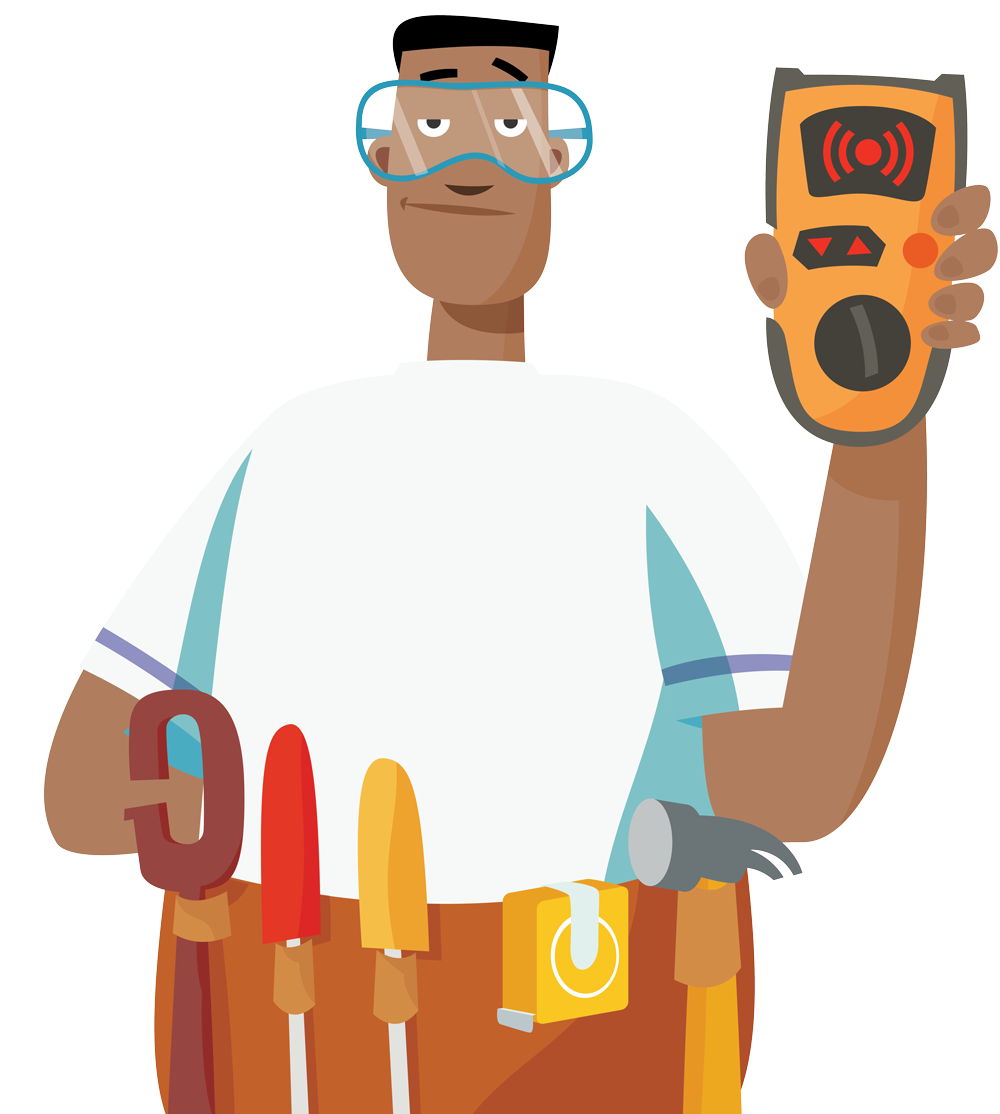
Each year, home electrical fires cause:
- an average of 51,000 fires
- nearly 500 deaths
- more than 1,400 injuries
- more than $1.3 billion in property damage
(National Fire Protection Association, 2003–2007)
(U.S. Consumer Product Safety Commission)
- Use light bulbs that match the recommended wattage on every light fixture.
- Conduct a basic assessment of your home electrical system, including electrical cords, extension cords, power plugs and outlets.
- Look for telltale signs of electrical problems, such as dim and flickering lights, unusual sizzling and buzzing sounds from your electrical system, and circuit breakers that trip repeatedly. Contact a qualified electrician immediately.
- Use extension cords only temporarily, and never with space heaters or air conditioners.
- Avoid overloading outlets. Consider having additional circuits or outlets added by a qualified electrician as needed.
- Install smoke detectors on every level of the home, inside each bedroom and outside each sleeping area.
- Test smoke detectors monthly to ensure that they are working properly.
The best way to protect your family and your home against the risk of electrical fires or electrocution is to hire a qualified, licensed electrician to perform any electrical work in your home. Content obtained from Electrical Safety Foundation International (ESFI). Learn more at www.electrical-safety.org.
Use the right type of fire extinguisher when fighting electrical fires, a Type C extinguisher.
In both commercial and residential buildings, different classes of fire are encountered and each requires specific knowledge on how it started and how to properly go about putting it out. Class C fires burn combustibles, but are distinct because they involve electrical components or equipment with the potential to be energized.
Be storm safe: before, during and after.
Here in the South, severe weather can strike almost anytime. And they bring electrical hazards that you may not be aware of. Know how to protect against power surges, what to do during and after storms and how to use generators safely.
- Unplug appliances and electronics, such as computers and televisions, to prevent damage from power surges due to lightning strikes.
- Surge protection may help prevent damages to your electronics, but may not safeguard against a direct lightning strike. If you live in an area prone to lightning, consider a lightning protection system.
- Alert your electric cooperative immediately about downed power lines.
- Never go close to downed power lines or any nearby standing water.
- Don’t try to outrun a storm. Instead, seek shelter in a house or other permanent enclosed space.
- Use battery-powered lanterns and flashlights instead of candles, which can start a fire.
- During storms with lightning, stay off corded phones and plugged-in electronics. Avoid plumbing and water, including bathing or doing laundry.
- If you’re advised to switch off the main power source to your home, flip each breaker and THEN turn off the main breaker.
- Never connect generators to your home’s wiring. This can energize power lines, which could endanger workers and you.
- Connect generators through a transfer switch installed by a qualified electrician, and connect appliances directly to the generator.
- Avoid dangerous exhaust fumes by operating your generator outdoors — never in a garage, storage room or near your open window. Always read the instructions first.
- Be sure the generator you have selected has ample capacity to supply the lighting, appliance and equipment you plan to connect.
- Do not operate your generator while standing in wet conditions. This could cause an electrical shock.
- Do not attempt to fill your generator’s tank while it is operating. Gasoline may ignite.
- Do not tamper with the engine’s speed adjustment. This could cause a fire.
- Keep a charged fire extinguisher nearby as a precaution.
- Use caution around flooded areas. Submerged outlets or electrical cords can be lethal.
- Have an electrician inspect your home and appliances before using electricity after any flooding or water damage.
- Do not touch a circuit breaker or replace a fuse with wet hands or while standing on a wet surface.
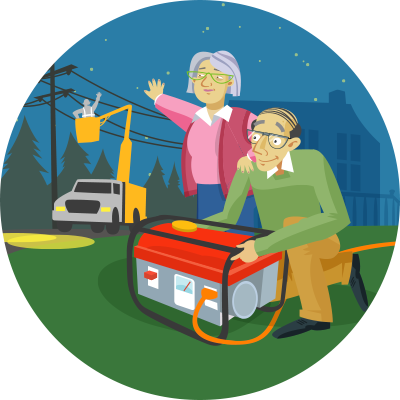
Water and fun go together. Water and electricity don’t.
Electricity is probably the last thing you think of when you take a swim or dip your toes in the water by a pier. But it should be one of the first things you think of. Learn how to be safe around pools, piers and docks so your water time will be the fun time it should be.
- Avoid contact with overhead power lines. Check clearance before raising or lowering your mast or spar.
- When determining overhead clearances, be sure to take the tide into consideration. Clearances may be adequate for your boat at low tide, but not at high tide.
- Make sure to keep all drying sails and sheet lines from blowing into power lines.
- Don’t haul, store or sail your boat unless you have at least 10 feet of clearance between the highest point of your boat and the lowest point of all power lines.
- When fishing onboard, make sure to check for overhead power lines before casting your line.
- As you boat, be aware of signs indicating underwater gas and electric utility lines. Do not anchor your boat near underwater cables or pipelines.
- Minimize electrocution from the onboard AC electrical system by ensuring the boat is properly wired by a professional marine electrician and is inspected periodically for damage or deterioration.
- All outdoor receptacles should be covered to keep them dry. This is especially important around pools, spas and other summer water activities.
- Make sure all electrical equipment used for swimming pools (even the cleaning equipment) is grounded.
- Electrical devices and cords should be at least 10 feet away from pools.
- When possible, use battery-operated electrical devices outside.
- Never handle electrical devices when you are wet — either from water activities or from perspiration.
- Make sure there are no power lines over a swimming pool.
- Do not swim during a thunderstorm.
- To avoid electric shock drowning, have an electrician inspect and upgrade your pool, spa or hot tub in accordance with applicable local codes and the National Electrical Code® (NEC).
- Fly kites in open fields, away from electrical wires.
- Do not use wire, metal or wet string on a kite. If your kite catches on a wire or on a high pole, don’t try to remove it. Call your local electric cooperative.
- Don’t fly a kite in wet or stormy weather.
- Do not play around power lines or climb trees near them.
- Go inside right away if you hear thunder or see lightning. Do not take shelter under trees.
Be storm safe: before, during and after.
Here in the South, severe weather can strike almost anytime. And they bring electrical hazards that you may not be aware of. Know how to protect against power surges, what to do during and after storms and how to use generators safely.

- Inspect heaters for cracked or broken plugs or loose connections before each use. If frayed, worn or damaged, do not use the heater.
- Never leave a space heater unattended. Turn it off when you’re leaving a room or going to sleep.
- Heaters must be kept at least three feet away from anything that can burn, including papers, clothing and rugs.
- Install smoke alarms on every floor of your home and outside all sleeping areas. Test them once a month.
- Plug space heaters directly into a wall outlet. Do not use an extension cord or power strip, which could overheat and result in a fire. Do not plug any other electrical devices into the same outlet as the heater.
- Place space heaters on level, flat surfaces. Never place heaters on cabinets, tables, furniture or carpet, which can overheat and start a fire.
- Inspect for dark, charred or frayed spots. Replace any worn or old heating pad or electric blanket.
- Never fold electric blankets when in use. Folded or tucked-in blankets could overheat and cause a fire.
- Do not allow anything, including other blankets or pets, on top of a heating pad or electric blanket when it is in use to avoid overheating.
- Heating appliances should never be left unattended or used while sleeping.
- Do not use electronics near water.
- Never sleep with electronics under your pillow.
- Do not run cords under carpets, rugs, furniture or out of windows.
- Do not overload outlets.
- Always turn off decorations when you’re sleeping or leaving your home.
- Inspect all decorations and discard any that are damaged or worn.
- Keep your natural Christmas tree hydrated by watering it daily.

- Fly kites in open fields, away from electrical wires.
- Do not use wire, metal or wet string on a kite. If your kite catches on a wire or on a high pole, don’t try to remove it. Call your local electric cooperative.
- Don’t fly a kite in wet or stormy weather.
- Do not play around power lines or climb trees near them.
- Go inside right away if you hear thunder or see lightning. Do not take shelter under trees.
- Ladders that come into contact with a power line, even those made of wood, can prove fatal.
- Keep all ladders at least 10 feet away from overhead power lines. Carry them horizontally.
- Unplug outdoor tools and appliances when not in use.
- Inspect power tools and appliances for frayed cords, broken plugs, and cracked or broken housing. Repair or replace damaged items.
- Water and electricity do not mix. Avoid damp conditions, including wet grass, when using electricity.
- Look up! If you see a wire in the area where you want to work, call your electric cooperative.
- Don’t build a tree house in trees with power lines in or near them.
- Don’t prune a limb that is near or touching a wire. Tree limbs contain water and can conduct electricity. If possible, hire a professional.
- Although the service wire running from the transformer to your house is usually insulated, never consider it safe to work around. The insulation can be worn, creating a hazard.

- Avoid contact with overhead power lines. Check clearance before raising or lowering your mast or spar.
- When determining overhead clearances, be sure to take the tide into consideration. Clearances may be adequate for your boat at low tide, but not at high tide.
- Make sure to keep all drying sails and sheet lines from blowing into power lines.
- Don’t haul, store or sail your boat unless you have at least 10 feet of clearance between the highest point of your boat and the lowest point of all power lines.
- When fishing onboard, make sure to check for overhead power lines before casting your line.
- As you boat, be aware of signs indicating underwater gas and electric utility lines. Do not anchor your boat near underwater cables or pipelines.
- Minimize electrocution from the onboard AC electrical system by ensuring the boat is properly wired by a professional marine electrician and is inspected periodically for damage or deterioration.
- All outdoor receptacles should be covered to keep them dry. This is especially important around pools, spas and other summer water activities.
- Make sure all electrical equipment used for swimming pools (even the cleaning equipment) is grounded.
- Electrical devices and cords should be at least 10 feet away from pools.
- When possible, use battery-operated electrical devices outside.
- Never handle electrical devices when you are wet — either from water activities or from perspiration.
- Make sure there are no power lines over a swimming pool.
- Do not swim during a thunderstorm.
- To avoid electric shock drowning, have an electrician inspect and upgrade your pool, spa or hot tub in accordance with applicable local codes and the National Electrical Code® (NEC).
- Contact a qualified, licensed electrician to perform any electrical work in your home, including the installation and services of air conditioning and other cooling equipment.
- Have electric-powered equipment inspected and maintained regularly for safety.
- Make sure your equipment has the label indicating it is listed by a recognized testing laboratory.

- The Electrical Safety Foundation International strongly recommends hiring a qualified, licensed electrician to perform any electrical work in your home. However, if you do decide to do it-yourself, consider the following important safety tips.
- Make an effort to learn about your home electrical system so that you can safely navigate and maintain it.
- Never attempt a project that is beyond your skill level. Knowing when to call a professional may help prevent electrical fires, injuries and fatalities.
- Always turn off the power to the circuit that you plan to work on by switching off the circuit breaker in the main service panel.
- Be sure to unplug any lamp or appliance before working on it.
- Test the wires before you touch them to make sure that the power has been turned off.
- Never touch plumbing or gas pipes when performing a do it yourself electrical project.
- Use only weatherproof electrical devices for outside activities.
- Protect outdoor electrical devices from moisture.
- Use ground fault circuit interrupters (GFCIs) with every power tool to protect against electric shocks.
- Do not use power tools with an extension cord that exceeds 100 feet in length.
- Never use power tools near live electrical wires or water pipes.
- Wear appropriate personal protective gear at all times.
- Check cold weather tools, such as leaf and snow blowers, along with their power cords, for unusual wear and tear. Repair or replace worn tools or parts right away.
- Unplug and safely store battery chargers that won’t be in use again until spring.
- Make sure electrical equipment that has been wet is inspected and reconditioned by a certified repair dealer.
- Keep dry leaves swept away from outdoor lighting, outlets and power cords.
Download your free safety guides
Your safety is our priority. We’ve prepared these safety tips to help keep you and your family safe around electricity. Download your free safety guides today.




